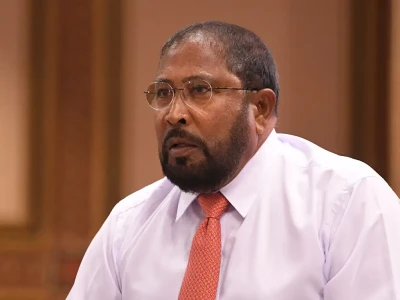
Solih defends India pacts; criticises PNC’s shift in power
The former president remarked that the PNC, which had previously criticised his administration’s close ties with India, is now pursuing similar policies.
Former President Ibrahim Mohamed Solih on Saturday criticised the ruling People's National Congress (PNC) government for its shifting stance toward India.
In a speech delivered at the opposition Maldivian Democratic Party (MDP) councillors' conference in Kulhudhuffushi, Solih noted the contrast between the PNC’s rhetoric about India while in opposition and its actions after assuming power in November.
President Mohamed Muizzu’s recent visit to India, where his government discussed implementing agreements initiated by the previous administration, drew Solih’s attention. The former president remarked that the PNC, which had previously criticised his administration’s close ties with India, is now pursuing similar policies.
"The very agreements they opposed when in opposition are now being carried forward. It is clear that the current government has recognised the importance of the work we began," said Solih.
Solih highlighted several controversial topics from his administration that were misrepresented by the PNC when they were in opposition. He pointed out how the new government is continuing with these projects despite its earlier objections.
-
The PNC-led opposition had previously claimed that the airport development in HDh. Hanimaadhoo would lead to the area becoming a military base populated by Indians. Despite these concerns, the runway development is now proceeding as planned.
-
During Solih’s tenure, the Uthuru Thilafalhu (UTF) project was described by the PNC as a military facility for the Indian army. However, the current government has decided to continue with the agreement, contradicting its earlier claims.
-
The PNC had strongly opposed the establishment of an Indian consulate in Addu, portraying it as an attempt to settle Indian nationals in the southern province. Yet, discussions regarding the consulate are ongoing under the new administration.
Solih criticised the government for what he described as hypocrisy in its treatment of India.
"When in opposition, they insulted India. They accused us of compromising our sovereignty. But today, they are implementing the same agreements," he said.
He also referenced how some members of the opposition spread rumours about the presence of Indian military personnel in the Maldives.
"There were even searches for 'Rohit' in Thilafalhu," Solih said, alluding to an incident where opposition figures accused the previous government of harbouring Indian soldiers.
Solih went on to express his satisfaction that the development initiatives he began are now recognised as necessary by the new government.
"I am pleased to see that the work we started was indeed the right path for the country’s development and for the people," he stated.
The former president claimed that many citizens who voted for the current government are now regretting their decision. Solih shared an anecdote about a conversation with a voter who admitted to being misled by the PNC’s anti-India rhetoric.
"Someone called me and said, ‘I didn’t vote for Ibrahim Mohamed Solih because I believed their claims about armed Indian soldiers. But now, I know it was all a lie,’" Solih recounted.
Solih’s remarks highlight the changing dynamics of Maldivian foreign policy, especially in its relationship with India. His speech suggests that the PNC government’s actions are at odds with its earlier rhetoric, causing disillusionment among voters who expected a shift from the previous administration’s policies.




